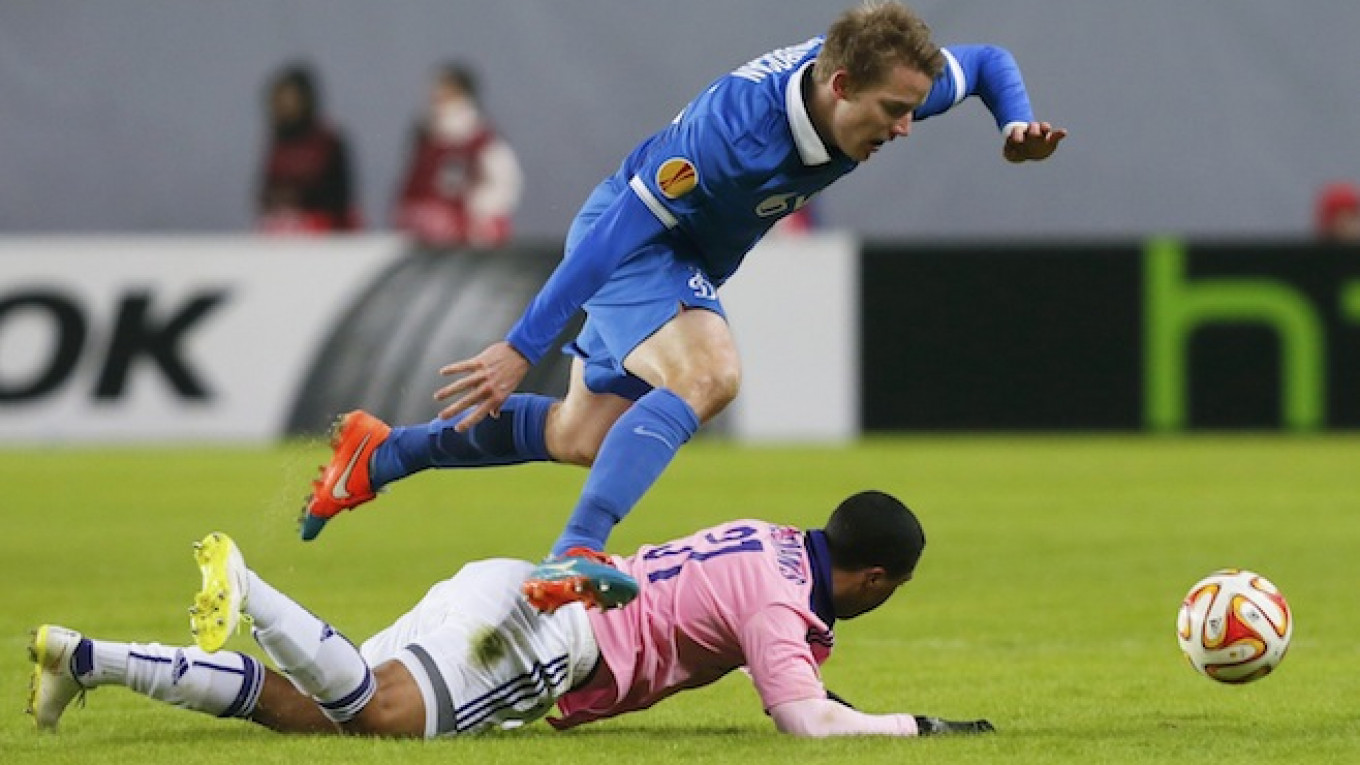UEFA is prepared to soften its Financial Fair Play rules for Russian and Ukrainian clubs that are being battered by their countries' economic problems.
The FFP rules were introduced for the 2011-12 season to discourage clubs from making large losses, with so-called "financially doped" teams potentially being banned from European competitions like the Champions League.
With the Russian and Ukrainian currencies having dropped sharply in value over the last year and the two countries set for recession, many clubs' financial plans have been thrown into turmoil.
UEFA told The Associated Press in a statement that the economic problems "may be taken into account as an exceptional circumstance and a mitigating factor" in FFP investigations, though no clubs will be exempted entirely from the regulations.
"The impact of the currency devaluation will need to be evaluated carefully and on a case by case basis," UEFA added.
In a sign the organization is taking the issue seriously, UEFA's top FFP official Andrea Traverso visited Moscow last month for talks with the Russian Football Union, league and clubs. The Ukrainian Football Federation is also in contact with UEFA over how FFP could apply to its clubs, spokesman Pavel Ternovoi said.
Last month UEFA announced that two Moscow clubs, Lokomotiv and Dynamo, which are both in contention to qualify for the Champions League this season, were under investigation regarding possible breaches of FFP rules in their 2014 accounts. More clubs could come under the microscope when 2015 accounts are presented next season.
Russian sides Zenit St. Petersburg, Rubin Kazan and Anzhi Makhachkala were all fined in May for breaching FFP rules, although they are not currently under investigation.
U.K.-based sports lawyer Daniel Geey said that UEFA has significant leeway in how it interprets FFP regulations and when it grants mercy to clubs affected by economic problems beyond their control.
"There's a genuine argument to be said that if there is such a substantive currency crash, that it could, to all intents and purposes, through no fault of the club, put that club into FFP breach," he said. "UEFA may be more sympathetic to their plight, bearing in mind the new financial constraints that are placed upon them."
The economic crisis is the first of its kind to test the FFP rules. Previous economic problems, such as those in Greece, have occurred in countries which used the euro, which limited the potential for clubs' financial figures to be distorted by a currency plunge.
Russia and Ukraine, home to Champions League regulars like Zenit and Shakhtar Donetsk, have both seen their currencies fall sharply over the last year of political and economic turmoil. The Russian ruble has lost almost half of its value against the dollar since January 2014, while the Ukrainian hryvna is down by nearly two-thirds.
The currency falls have put many clubs in dire straits because top players are typically paid in dollars or euros, heaping extra costs on the budgets of clubs which in some cases were already struggling to comply with FFP.
Geey said that UEFA may take a dim view of clubs which chose to pay their players in foreign currency, effectively betting that the exchange rate would not rise.
"When they're entering into contracts agreed, usually, in euros … then they are taking that currency risk," he said. "That again is the club's risk that they have taken on board, that they will know the euro rate."
In recent months, the Russian Premier League has pushed for players to accept payment at a fixed exchange rate on dollar and euro-denominated contracts — effectively a pay cut, since it is set lower than the market rate — but acceptance has been patchy.
Perhaps the biggest threat for Russian and Ukrainian clubs could come if the economic problems mean that they fail to meet payments to other clubs or to the tax authorities, Geey warned.
"That's where UEFA has been extremely draconian in their sanctions," he said. "If those debts haven't been paid by a certain crystallized deadline, then a disciplinary investigation will be opened on behalf of UEFA. … In a lot of cases it does lead to a ban."
Spanish side Malaga was banned from Europe for a year in 2012 over unpaid bills, while Serbian champion and former European Cup winner Red Star Belgrade was excluded from this season's Champions League for similar reasons.
It's not only Russia's clubs that are in financial difficulty. The country's football federation failed to pay coach Fabio Capello for over seven months until February, when billionaire Alisher Usmanov stepped in to clear the backlog. The Italian coach's contract is denominated in euros and has become significantly more expensive for the federation as the ruble fell.
A Message from The Moscow Times:
Dear readers,
We are facing unprecedented challenges. Russia's Prosecutor General's Office has designated The Moscow Times as an "undesirable" organization, criminalizing our work and putting our staff at risk of prosecution. This follows our earlier unjust labeling as a "foreign agent."
These actions are direct attempts to silence independent journalism in Russia. The authorities claim our work "discredits the decisions of the Russian leadership." We see things differently: we strive to provide accurate, unbiased reporting on Russia.
We, the journalists of The Moscow Times, refuse to be silenced. But to continue our work, we need your help.
Your support, no matter how small, makes a world of difference. If you can, please support us monthly starting from just $2. It's quick to set up, and every contribution makes a significant impact.
By supporting The Moscow Times, you're defending open, independent journalism in the face of repression. Thank you for standing with us.
Remind me later.






